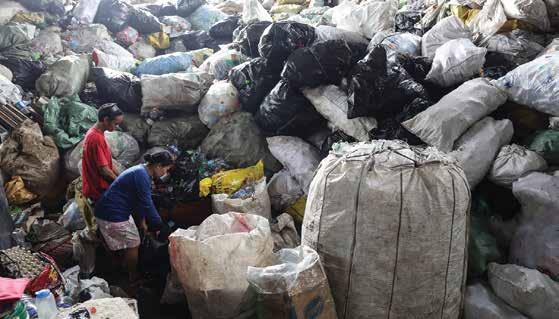
2 minute read
PH on track to achieve agenda for prosperity - DBM chief
MANILA – The Philippines is heading in the right direction to attain its agenda for prosperity, Budget Secretary Amenah Pangandaman told the Singaporean business community as she enticed them to invest in the country.
tribute to the revitalization of the Philippine economy.
Advertisement
among others,” Pangandaman added.
11 percent distrust), TeleRadyo (66 percent trust, eight percent distrust), regional or local newspapers (64 percent trust, eight percent distrust) and ABS-CBN (62 percent trust, 18 percent distrust).
Other brands included in the survey were Radyo Pilipinas (61 percent trust, nine percent distrust), PTV (61 percent trust, 12 percent distrust), SunStar (58 percent trust, 10 percent distrust), Abante/Abante Tonight (50 percent trust, 15 percent distrust) and Rappler (47 percent trust, 33 percent distrust).
TikTok usage worldwide increased as 44 percent of respondents aged 18 to 24 said they used TikTok for any purpose, with 20 percent using it for news –up five points from last year.
The report clarified that the survey scores “should not be treated as a list of the most or least trusted brands as it is not exhaustive.” g
During the second Philippine Economic Briefing (PEB) in Singapore, Pangandaman noted that the Marcos administration’s priority expenditures are aligned with the eight-point socioeconomic agenda and cater to the objectives under the Philippine Development Plan 2023-2028.
“Today, we bring you good news from the Philippines. We remain on track with our Agenda for Prosperity in spite of global headwinds and the challenges of economic recovery after the pandemic lockdowns,” Pangandaman said.
“And so, we invite you to become our partner as we build an inclusive and sustainable economy that would not only uplift every individual, family and business in the Philippines but would benefit the world and generations to come. The time to invest in the Philippines is now,” she added.
Priority sectors
Pangandaman also enumerated the Marcos government’s priority sectors that would con-

Determined to make agriculture “a driving force for growth and the main source of food security,” the current administration gave the agriculture and agrarian reform sector a budgetary boost of around 29 percent from its previous year’s allocation to improve productivity and re-establish the Philippines as the top exporter of agricultural products, Pangandaman said.
She added that the infrastructure spending was maintained at 5 to 6 percent of the gross domestic product (GDP) set in the Medium-Term Fiscal Framework.
“This was allocated USD23.9 billion or 25.3 percent of the national budget and equivalent to 5.5 percent of GDP,” she said, stressing the importance of infrastructure spending to sustain the country’s growth momentum, considering that infrastructure is the “backbone of the economy.”
“The bulk of the infrastructure budget is intended for the development of physical infrastructure aimed at improving physical connectivity throughout the country through the construction of accessible road networks, railways, buildings, and flood control infrastructure,
Pangandaman said budgetary support was also provided for social infrastructure development, as well as for irrigation systems and reforestation projects.
She added that the government, acknowledging the importance of sustainable economic growth, raised the budget for climate change adaptation and mitigation measures by about 60 percent compared to the previous year’s allocation.
“This will include investments in water sufficiency and renewable energy infrastructure, as well as alternative resources,” Pangandaman said.
Pangandaman said the proposed 2024 budget will prioritize “shovel-ready” infrastructure projects, investments in human capital development, and sustainable agriculture and food security for the continuity and sustainability of gains from this year’s priority programs.
To complement the priority programs, the government is pursuing key structural reforms and introducing fresh initiatives that promote sound fiscal management, a green economy, and a more efficient and lean bureaucracy, Pangandaman said.
'Going digital'







